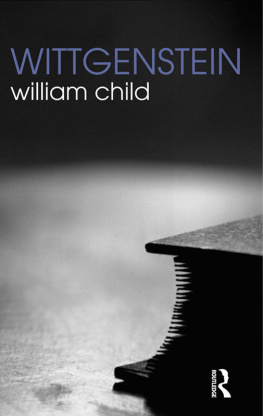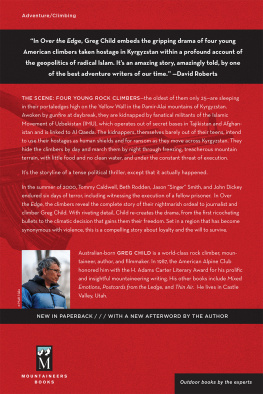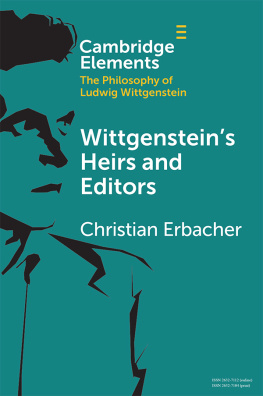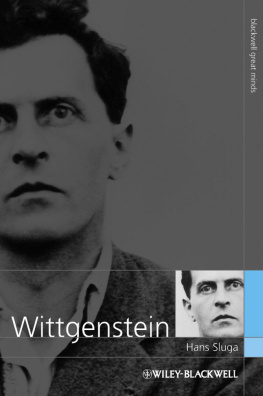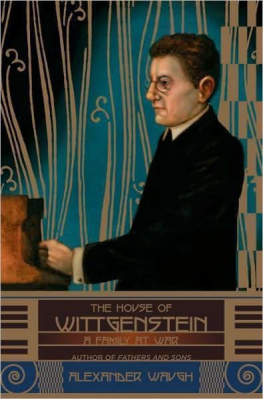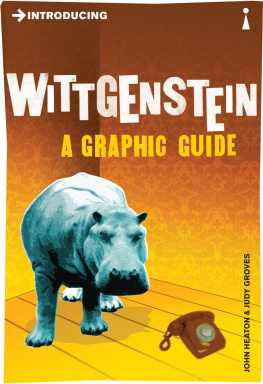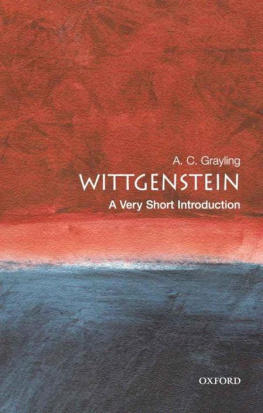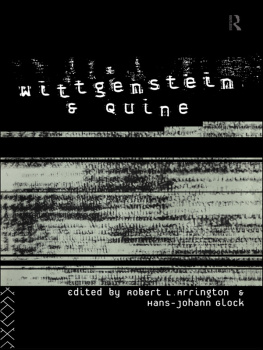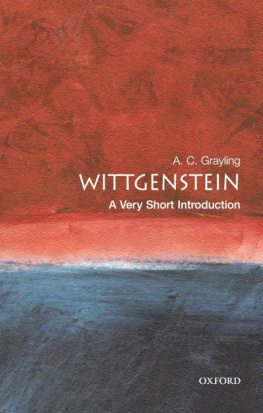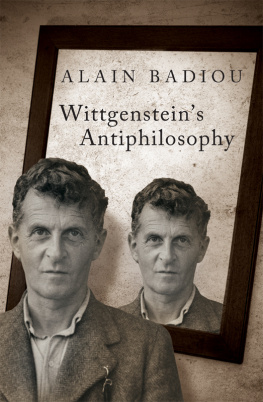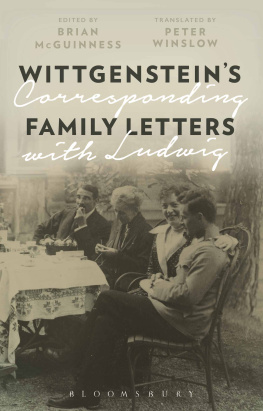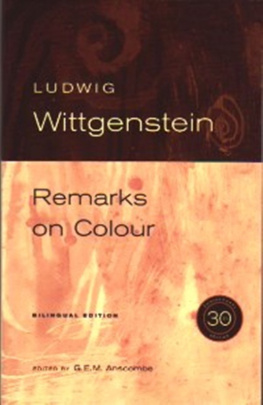Child - Wittgenstein
Here you can read online Child - Wittgenstein full text of the book (entire story) in english for free. Download pdf and epub, get meaning, cover and reviews about this ebook. City: London, year: 2008, publisher: Routledge, an imprint of Taylor & Francis Books Ltd, genre: Religion. Description of the work, (preface) as well as reviews are available. Best literature library LitArk.com created for fans of good reading and offers a wide selection of genres:
Romance novel
Science fiction
Adventure
Detective
Science
History
Home and family
Prose
Art
Politics
Computer
Non-fiction
Religion
Business
Children
Humor
Choose a favorite category and find really read worthwhile books. Enjoy immersion in the world of imagination, feel the emotions of the characters or learn something new for yourself, make an fascinating discovery.
Wittgenstein: summary, description and annotation
We offer to read an annotation, description, summary or preface (depends on what the author of the book "Wittgenstein" wrote himself). If you haven't found the necessary information about the book — write in the comments, we will try to find it.
Child: author's other books
Who wrote Wittgenstein? Find out the surname, the name of the author of the book and a list of all author's works by series.
Wittgenstein — read online for free the complete book (whole text) full work
Below is the text of the book, divided by pages. System saving the place of the last page read, allows you to conveniently read the book "Wittgenstein" online for free, without having to search again every time where you left off. Put a bookmark, and you can go to the page where you finished reading at any time.
Font size:
Interval:
Bookmark:
Wittgenstein
Ludwig Wittgenstein (18891951) is considered by most philosophers even those who do not share his views to be the most influential philosopher of the twentieth century. His contributions to the philosophy of language and philosophy of mind as well as to logic and epistemology permanently altered the philosophical landscape, and his Tractatus Logico Philosophicus and Philosophical Investigations continue to be studied in philosophy departments around in the world. In this superb introduction and overview of Wittgensteins life and work, William Child discusses:
Wittgensteins early work, Tractatus Logico-Philosophicus: its account of language, thought, and logic; its metaphysical remarks; and its view of the limits of language
the transition from the Tractatus to Philosophical Investigations
Wittgensteins later philosophy of language
intentionality and rule-following
philosophy of mind and psychology
knowledge and certainty
philosophy of religion and anthropology
the legacy and influence of Wittgensteins ideas in philosophy, and beyond.
Including a chronology, glossary, and helpful conclusions to each chapter, Wittgenstein is essential reading for anyone coming to Wittgensteins philosophy for the first time.
William Child is a Fellow in Philosophy at University College, Oxford, and University Lecturer at the University of Oxford. He is author of Causality, Interpretation, and the Mind (1994), and co-editor (with David Charles) of Wittgensteinian Themes: Essays in Honour of David Pears (2001).
Routledge Philosophers
Edited by Brian Leiter
University of Chicago
Routledge Philosophers is a major series of introductions to the great Western philosophers. Each book places a major philosopher or thinker in historical context, explains and assesses their key arguments, and considers their legacy. Additional features include a chronology of major dates and events, chapter summaries, annotated suggestions for further reading and a glossary of technical terms.
An ideal starting point for those new to philosophy, they are also essential reading for those interested in the subject at any level.
Hobbes | A. P. Martinich |
Leibniz | Nicholas Jolley |
Locke | E. J. Lowe |
Hegel | Frederick Beiser |
Rousseau | Nicholas Dent |
Schopenhauer | Julian Young |
Freud | Jonathan Lear |
Kant | Paul Guyer |
Husserl | David Woodruff Smith |
Darwin | Tim Lewens |
Aristotle | Christopher Shields |
Rawls | Samuel Freeman |
Spinoza | Michael Della Rocca |
Merleau-Ponty | Taylor Carman |
Russell | Gregory Landini |
Forthcoming:
Adorno | Brian OConnor |
Habermas | Kenneth Baynes |
Heidegger | John Richardson |
Hume | Don Garrett |
William Child
Wittgenstein

This edition published 2011
by Routledge
2 Park Square, Milton Park, Abingdon, Oxon, OX14 4RN
Simultaneously published in the USA and Canada
by Routledge
270 Madison Ave, New York, NY 10016
Routledge is an imprint of the Taylor & Francis Group, an informa business
2011 William Child
The right of William Child to be identified as author of this work has been
asserted by him in accordance with sections 77 and 78 of the
Copyright, Designs and Patents Act 1988.
All rights reserved. No part of this book may be reprinted or reproduced or utilized in any form or by any electronic, mechanical, or other means, now known or hereafter invented, including photocopying and recording, or in any information storage or retrieval system, without permission in writing from the publishers.
British Library Cataloguing in Publication Data
A catalogue record for this book is available from the British Library
Library of Congress Cataloging in Publication Data
Child, William (T. William)
Wittgenstein / by William Child.
p. cm.(Routledge philosophers)
Includes bibliographical references (p. ) and index.
1. Wittgenstein, Ludwig, 18891951. I. Title.
B3376.W564C53 2010
| 192dc22 | 2010045108 |
ISBN 13: 9780415312059 (hbk)
ISBN 13: 9780415312066 (pbk)
ISBN 13: 9780203817759 (ebk)
For Julia
Acknowledgements
Many people have helped me, in many ways, in the writing of this book.
I first learned about Wittgenstein from David Pears, who taught me as an undergraduate and graduate student in Oxford; from P. M. S. Hacker, who supervised my work on Wittgenstein as a BPhil student; and from John McDowell, with whom I studied the philosophy of logic and language for the BPhil. Their teaching and writings have had an enduring influence on my work.
I have learned an enormous amount from colleagues in Oxford and elsewhere with whom I have discussed Wittgenstein, and from written comments on my work. I am particularly grateful to Arif Ahmed, Anita Avramides, Tom Baldwin, Bill Brewer, John Campbell, David Charles, Naomi Eilan, Philippa Foot, Elizabeth Fricker, Jane Heal, Marie McGinn, Adrian Moore, Christopher Peacocke, Roger Squires, Peter Sullivan, Alberto Voltolini, and Tim Williamson.
A number of anonymous referees reviewed the proposal for this book and offered valuable advice and feedback. And four anonymous readers read the entire typescript for the publishers, making detailed comments and suggestions. Their advice has been extremely helpful and has led to many improvements.
I have discussed Wittgensteins work with several generations of undergraduate and graduate students whom I have taught in Oxford. I have been lucky to have had such consistently clever and committed students and I am grateful to them all.
Over the last ten years or so, I have presented work on or relating to Wittgenstein at conferences and workshops in Lund, Beijing, Bertinoro, Washington DC, Murcia, Canterbury, Lisbon, Stirling, Reggio Emilia, Santa Cruz, Aberdeen, Stockholm, Kirchberg, Hatfield, and Southampton. And I have given talks on Wittgensteinian themes at the Universities of Bristol, East Anglia, Nottingham, Oxford, Reading, Southampton, Vercelli, Warwick and York; at Trinity College Dublin and University College Dublin; and at the Institute of the Czech Republic in Prague. I would like to thank the organizers of those events as well as the participants whose questions, comments, and criticisms of my contributions have been very helpful.
I am grateful to Julia Drown, Dexter Drown, and Ottilie Drown for much help and encouragement while I have been working on this book.
I would like to thank the Series Editor, Brian Leiter, for inviting me to write the book; and Tony Bruce and Adam Johnson from Routledge.
In , I have used some material that first appeared in my article Memory, Expression, and Past-Tense Self-Knowledge, Philosophy and Phenomenological Research, 73, 2006, pp. 5476. I am grateful to the editor and publishers for permission to do so.
Next pageFont size:
Interval:
Bookmark:
Similar books «Wittgenstein»
Look at similar books to Wittgenstein. We have selected literature similar in name and meaning in the hope of providing readers with more options to find new, interesting, not yet read works.
Discussion, reviews of the book Wittgenstein and just readers' own opinions. Leave your comments, write what you think about the work, its meaning or the main characters. Specify what exactly you liked and what you didn't like, and why you think so.

